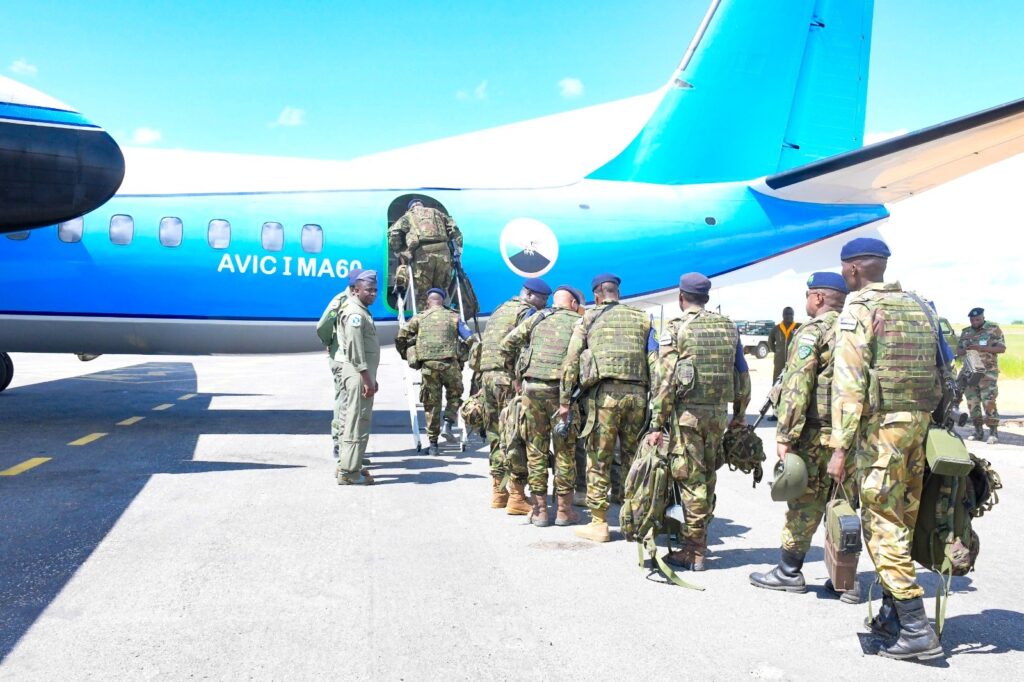GUEST OPINION AND ANALYSIS
CHIKONDI CHIDZANJA

Since the announcement of the Southern African Development Community (SADC) Mission in Mozambique (SAMIM) drawdown from Cabo Delgado province, there have been various criticisms about the intervention. Some have called the withdrawal premature; some have labeled it a regional failure and others have questioned the SADC’s competence while accusing it of turning away from a terrorist threat on its doorstep. The criticisms reached a crescendo recently with the resurgence of terror attacks in the area. However, what the critics miss is hidden in plain sight: the conduct of host country Mozambique. The host country will play a decisive role in a return to peace in Cabo Delgado.
Mozambique took a long time to admit to the presence of an insurgency and to label it as such in meetings with the SADC. When it first sought outside help, it turned to private military companies (PMCs) such as the Dyck Advisory Group (DAG) and Russia’s Wagner Group in late 2019. Both of these companies proved unable to contain the insurgency and took heavy casualties. When Mozambique looked for international support, it prioritized a bilateral engagement with Rwanda, which sent troops in 2021, earlier than the SADC. Even when SAMIM finally was formed, its troops were relegated to peripheral areas away from strategic locations in Cabo Delgado. Rwanda was assigned to the primary strategic areas for its operations. The optics did not favor SAMIM.
In the end, one cannot help but perceive that SAMIM forced its presence on Mozambique and had to play catch-up with Rwanda, which already was on the ground. SAMIM was not a priority for the host state and clearly played second fiddle.
Given this, the withdrawal of SAMIM should be analyzed from several angles. First, the withdrawal of SAMIM provides an opportunity for Mozambique to assume responsibility and ownership of its security. The European Union Military Assistance Mission Mozambique (EUMAM Mozambique) formerly known as EU Training Mission in Mozambique (EUTM-Mozambique) has been training and supporting the Mozambican Armed Forces (FADM) in protecting civilians and restoring safety and security in the Cabo Delgado province since 2021. The EUTM provided military training to equip FADM troops for quick-reaction force operations. However, instead of Mozambique assuming greater responsibility and ownership as SAMIM withdraws, it has allowed Rwanda to deploy an additional 2,000 troops. Initially, in 2021, Rwanda had sent a 1,000-person contingent of the Rwanda Defence Force (RDF) and the Rwanda National Police (RNP). That force has grown to approximately 4,500.
Second, SAMIM should be applauded for quickly intervening in this ad hoc mission. From conceptualization to implementation, SAMIM drafted its own mandate and made its own calls with regard to the mission operation. Most of SAMIM’s operational funding came from SADC member states. The SAMIM mandate was pragmatic and time specific. The SADC Standby Force Rapid Deployment Capability (RDC) primarily was deployed from July 2021 to July 2022 under Scenario 6, the African Standby Force’s most serious scenario, which calls for rapid intervention in crises. However, due to the volatile security situation on the ground, the SAMIM mandate was extended by one year to July 2023 with a transition from Scenario 6 to 5. In April 2024, SAMIM began to withdraw from Cabo Delgado. This shows a consistent and systematic adherence to procedure in an ad hoc, pragmatic, nimble and adaptive fashion.
During its time, SAMIM marked some important achievements, including liberating villages from the grip of terrorism, dismantling terror bases and securing roads for the free movement of humanitarian aid.
Third, some critics point to a lack of financial resources as a significant factor in SAMIM’s withdrawal. There is merit to this argument, but it is not the decisive point. In fact, if financial investment translated to peace, then the conflicts in the Democratic Republic of the Congo and the Sahel region would be long over, due to the millions of dollars poured into peacekeeping efforts. Thus, additional funds may simply have left SAMIM ensnared in a protracted conflict without an exit strategy. Peacekeeping analysts must stop using finances as a determining factor in a mission’s operational success. Going forward, there is a need to prioritize the peacebuilding toolbox that addresses the long-standing grievances of the Cabo Delgado community. These include underdevelopment and the community not benefiting from natural resource wealth. SAMIM is not a singular tool to deal with the crisis. Alongside the mission, other actors should have developed other peacebuilding tools to complement it.
In conclusion, could SAMIM have been better? In hindsight, yes, it could have been more proactive in its engagement with stakeholders. Critics have correctly pointed out that much of the SAMIM mission was shrouded in secrecy with little information made available to the public.
However, given the circumstances, resources and the ad hoc nature of SAMIM, this was perhaps the best they could have done. SAMIM operated in a hostile environment in which the host country had different priorities from that of a regional force. The environment itself is crowded with other players that were accorded primary tasks in strategic areas while the regional force was on the periphery. In such an environment there is little a regional standby force can achieve in the long term. Of course, the lessons learned will serve the future interventions in the region. If factors such as its mandate, the relationship with the host country and lack of understanding of the nature of ad hoc interventions are comprehensively understood, then SAMIM did its part to advance peace support operations in the region. SAMIM exemplifies the principle of “African solutions to African problems.” As the peace operations landscape is rapidly changing, the SADC’s approach serves as an example of the adaptive peace paradigm allowing for sustainable interventions.
About the Author: Chikondi Chidzanja is a Ph.D. candidate in political science at Stellenbosch University in South Africa. He is a doctoral researcher in the university’s Conflict, Peacebuilding & Risk Unit (CPRU). His research focus is on institutional multilateral counterterrorism responses and peacekeeping in SADC and ECOWAS. He obtained his master’s degree in international relations and world order from the University of Leicester in the United Kingdom.

